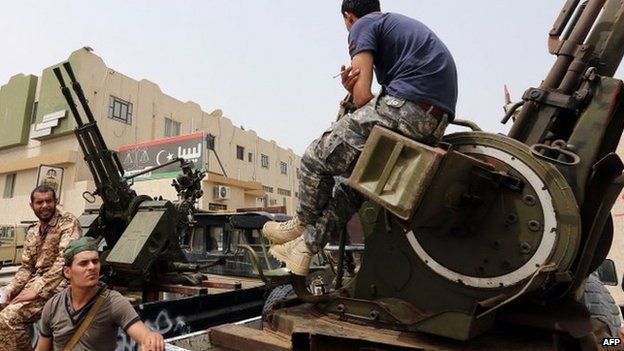Why Libya's militias are up in arms
- Published

Libya's disgruntled militiamen are flexing their muscles in the capital, Tripoli.
Both the foreign and justice ministry buildings in the city remain surrounded by a mix of young and older men in pick-up trucks mounted with anti-aircraft guns.
Among those around the foreign ministry - the first to be targeted - are some feverish former rebel fighters from the uprising that toppled Muammar Gaddafi in 2011. They are threatening a "second revolution" if they continue to be ignored.
Other agitators are part-time activists and supporters of armed groups from various areas.
By Sunday afternoon, some had settled in comfortably for a picnic on the pavement, others milled about.
But they are refusing to back down from their demand calling for the expulsion of officials who worked for the government during the Gaddafi era.
For those uninitiated in Libyan affairs, three separate incidents on Sunday could have been mistaken for a potential coup.
Not only was the foreign ministry surrounded, but the interior ministry was ransacked by gunmen demanding salaries, and there was a scuffle at the state TV station building between gunmen and employees, which a manager said briefly brought work to a halt.
It seems separate armed groups were involved.
"The issue is not simple. It's not like you imagine it," one protester at the foreign ministry tried to explain.
"Who doesn't want his country to stabilise or be secure? We're not here to kill each other," he said.
"But the government didn't respect the rights of the martyrs, and then surprised us with a foreign ministry that was full of people who worked under the Gaddafi government."
Intimidation tactics
There is a complex network of armed groups and militias in the capital.
It includes former rebels from different parts of the country, unemployed vigilantes that never fought, ex-convicts released during the war, and a temporary force formed by the ministry of interior known as the Supreme Security Committee (SSC), which is struggling to remain relevant.
The hardline Salafist Islamist militias are in a league of their own. Other militias largely ostracise them and city residents often point in their direction when something goes wrong.
They have appointed themselves "fighters of crime and drug-trafficking", and last year were accused of destroying some Sufi shrines, but otherwise in Tripoli they tend to be quite discreet in their manoeuvres.
All have been used by the transitional authorities - with varying degrees of frequency and legitimacy - to fill the security vacuum since the fall of Gaddafi.
There are also claims that some of these armed protests are fuelled by political in-fighting within Libya's parliament, the General National Congress (GNC).
Some politicians - it is believed - use the backing of their various regional or city-based militias to press for laws they want to see passed or for the removal of officials they dislike.
'Political isolation bill'
The current blockade is driven by calls for the adoption of the so-called "political isolation bill".
Critics of the proposed legislation argue that it is over-reaching in its initial draft.
It is meant to prevent officials who worked under the former Gaddafi-era government from participating in politics.
Politicians in the GNC remain deadlocked over the details of the law, and there are worries that it could see some of the GNC's own members and those in the cabinet isolated.
Political analyst Ibrahim Alkarraz is eager to see the bill adopted.
"The people it applies to should be the ones who have committed crimes against the Libyan people, like abuse of power, rape, and theft. This law is crucial to prevent anyone from sabotaging the revolution," he says.
"I don't consider these armed groups as assailants against the government, but, rather a stimulant.
"They knocked on all doors, and didn't find anyone to listen to them. They demanded change, and nothing changed - not in the slightest," Mr Alkarraz adds.
It is not a narrative that many Libyans will agree with, though many can relate to the premise of his argument.
Guima Gmati, a political activist and one of the founding members of the Taghyeer (Change) Party - which is not represented in parliament - disagrees with the intimidation tactics.
"These are not democratic practices, but rather a practice of chaos in an unacceptable manner," he says.
"The differences in political visions should be resolved through dialogue and the power of logic - not the logic of force and the threat of weapons."
Salaries cut
Prime Minister Ali Zidan has maintained an oft-repeated message since he came to power in October last year.
"This will make us more insistent, and we will not surrender to anyone or bend to anyone and no-one can twist our arm," he said on Sunday.
But the GNC has been stormed on several occasions for reasons varying from calls for the adoption of the political isolation law to the botched medical treatment programme for veterans, which was halted for a while because of corruption.
The justice ministry - currently surrounded by militiamen - was also briefly attacked by gunmen following televised remarks by the justice minister about illegal detention centres run by militias.
With every incident - big or small - there is frequently either a self-serving agenda being pursued or an underlying grievance long ignored.
Observers believe it is because the government's new security strategy focuses on gradually phasing militias out and replacing them with an organised national security apparatus.
It is doing this by cutting off salaries and raiding some of the militias' illegal headquarters across the capital.
But it is clear tensions are brewing and pragmatic voices on all sides are often drowned out.
The noose is tightening around those in the government trying to rein in the militias as their strategy begins to unravel.